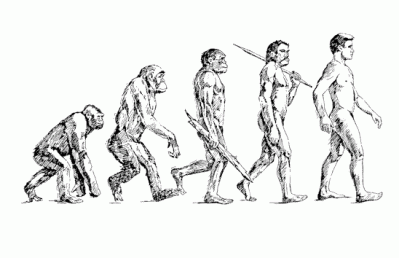
In a time where survival of the fittest means relatively nothing and most humans live to procreate despite illness, poverty and infertility, scientists are asking themselves the question: are we still evolving or have we come to an evolutionary standstill?

Evolution was pioneered by the renowned scientist Charles Darwin in his book The Origin of Species and defined as the theory that groups of organisms change with passage of time, mainly as a result of natural selection, so that descendants differ morphologically and physiologically from their ancestors. In the case of humans, the theory suggests that we descend from African ape ancestors. Many fossils including the infamous “Lucy” fossil of a complete body found in Ethiopia in 1974 dating back 3.2 million years old are evidence of this theory.
As is well known, evolution is accountable for many characteristic human traits, such as bipedalism (walking on two feet) and opposable thumbs. From a biological point of view, evolution is the change in genetic material of a population of organisms from one generation to the next. This means that very small alterations in Human DNA (called mutations) occur from one generation to the next which can, over time, lead to a substantial change in the population’s genetic data. This can thus lead to the formation of different species. Although there has been much debate as to how evolution functions, a number of genetic mechanisms can now be held accountable for these changes. The first is natural selection, which is the process by which beneficial mutations enhance a population’s reproducibility and increase their change of survival. It follows three simple rules: heritability, variation and survival. The other is genetic drift is the change in allele frequency from one generation to the next due to random sampling. It is a totally random mechanism.
As to the topic in question: are humans still evolving? Although there are opposing views on the subject – some scientist say we stopped evolving around 50,000 years ago when modern humans and culture began to emerge – it is quite difficult to completely deny that we humans still under the influence of evolution. It has been discussed and famously argued by geneticist Steve Jones that the process of natural selection has been undermined by modern technology. The survival of the fittest is not longer applicable, as almost everyone is likely to survive to reproductive age and procreate. Others argue that natural selection no longer has a direct effect on physical survival but that the “fittest” individuals can be described by their intellect. This theory is supported by writer Christopher Wills and the discovery in 2005 by Bruce Lahn of two supposedly new genes involved in brain development. Some, including the evolutionary biologist Steven Pinker, would even argue that technology has created “reverse evolution”. This means the “weaker” traits are no longer selected out of the human genome, possibly making us more susceptible to illness for example. Geoffrey Miller believes evolution is being driven by sexual selection and that by the means of assertive mating for intelligence, personality traits and health, new beneficial mutations are likely to be greatly selected for.
Some examples of the human gene pool currently evolving cannot be ignored. The discovery that a gene called CCR5-32 which can protect from the HIV-1 virus has greatly increased in parts of Africa where the disease is particularly widespread is one. Studies at the University of Chicago have shown that around 700 genes have been favoured by evolution over the past 15,000 years. These adaptations can be small, like genes increasing our ability to process lactose as the cow became more domesticated and the lightening of some Europeans skin in response to a general northward movement with less sunlight. Some very recent research (2009) by Stephen Sears has predicted the future women by studying some 14,000 women spanning three generations in Massachusetts. Following his findings, the future women will be shorter and curvier, be generally healthier and have higher fertility.
But there are some question marks which are difficult to answer. For instance, why has one form of the dopamine receptor gene developed a very high frequency in the human gene pool when it does not offer any beneficial mutations? On the contrary, it is associated with attention deficit hyperactivity disorder! A slightly more political view point is that many scientists including Pinker would rather believe that human evolution stopped thousands of years ago; guaranteeing that all racial and ethnic groups and still biologically equal.
At this point in time, most scientists will agree that yes, humans are still evolving, even if their definitions of evolution diverge. They also agree that is it impossible to predict the direction of evolution at this point in time. So whether we shall become futuristic cyborgs as suggested by Ray Kurzweil, simply more “beautiful, intelligent, symmetrical and healthy” as projected by Miller, develop a whole new species by colonising other planets as Wills point of view proposes or “befoul our planet that only an eccentric and hardy remnant of our species will remain” as proclaimed by Daniel Dennett is up to your personal view of our future as the human race.